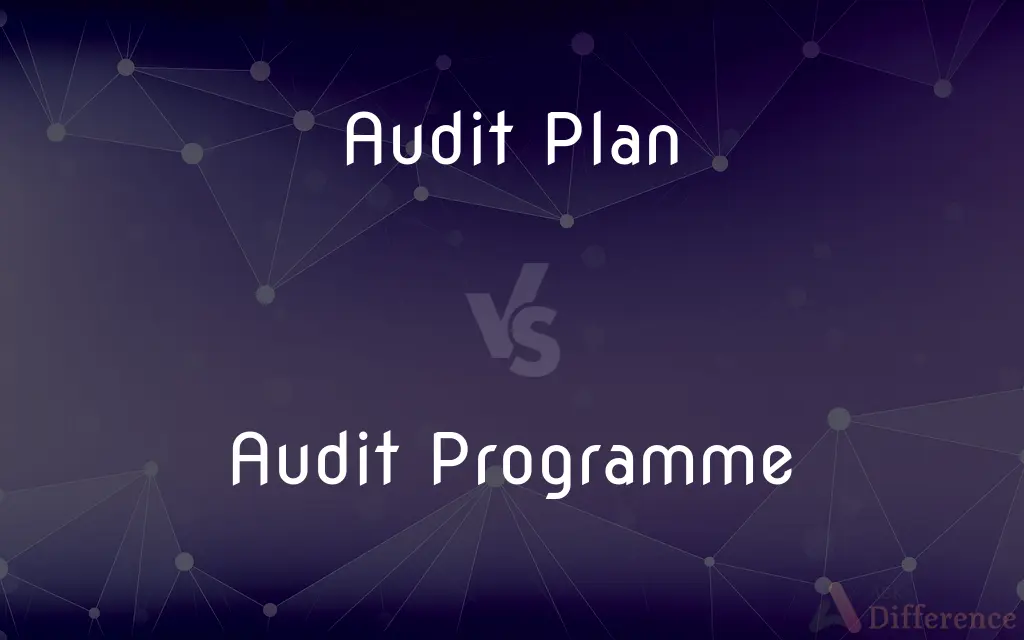Audit Plan vs. Audit Programme — What's the Difference?
By Tayyaba Rehman — Published on December 18, 2023
An Audit Plan outlines the strategy and objectives for an audit, while an Audit Programme details specific procedures to achieve the audit objectives.

Difference Between Audit Plan and Audit Programme
Table of Contents
ADVERTISEMENT
Key Differences
An Audit Plan serves as a roadmap, detailing the scope, objectives, timing, and direction to be taken during an audit. In contrast, an Audit Programme acts as a guide for auditors by specifying the exact steps, tests, and verifications necessary to meet the objectives set in the Audit Plan.
The formulation of an Audit Plan is generally a higher-level task that considers risk assessment, materiality, and areas of concern in the financial statements. In juxtaposition, an Audit Programme dives deeper, taking those overarching goals from the Audit Plan and breaking them down into actionable tasks.
While an Audit Plan lays the groundwork for the entire audit by defining its approach and identifying areas of focus, an Audit Programme acts on this groundwork, offering a sequential procedure to ensure the audit's efficiency and completeness, covering all requisite audit assertions.
An Audit Plan often involves a broader perspective, taking into account external factors like regulatory changes or industry trends that might impact the audit. Conversely, an Audit Programme remains more focused on the internal mechanisms, ensuring that every necessary procedure is followed for audit verification.
To encapsulate, an Audit Plan provides an overarching strategy for an audit's execution, setting the direction and main objectives. Meanwhile, an Audit Programme translates this strategy into detailed, step-by-step actions that auditors should undertake.
ADVERTISEMENT
Comparison Chart
Primary Purpose
Outlines audit strategy and objectives
Details specific procedures to achieve audit objectives
Level of Detail
Broad, strategic
Detailed, procedural
Focus
Scope, objectives, timing, and direction of audit
Steps, tests, and verifications for the audit
Incorporation of External Factors
Often considers external factors like regulatory changes
Primarily focused on internal audit procedures
Sequence in Audit Process
Precedes the Audit Programme
Follows the creation of the Audit Plan
Compare with Definitions
Audit Plan
Audit Plan is a roadmap for the entire audit process.
Before starting the audit, the team devised a comprehensive Audit Plan.
Audit Programme
Audit Programme covers all requisite audit assertions.
The Audit Programme was updated to include the latest verification techniques.
Audit Plan
Audit Plan sets the direction and objectives for an audit.
The Audit Plan highlighted the key areas to be investigated.
Audit Programme
Audit Programme is a step-by-step guide for auditors.
The new joiners were introduced to the company's standard Audit Programme.
Audit Plan
Audit Plan outlines the scope and timing of an audit.
Based on the Audit Plan, the team allocated resources for the upcoming quarter.
Audit Programme
Audit Programme details the specific procedures of an audit.
Following the Audit Programme ensured no step was missed.
Audit Plan
Audit Plan provides an overarching strategy for the audit's execution.
The success of the audit was attributed to a well-thought-out Audit Plan.
Audit Programme
Audit Programme translates audit objectives into actionable tasks.
The detailed Audit Programme made the verification process seamless.
Audit Plan
Audit Plan involves risk assessment and consideration of materiality.
The new regulatory changes were factored into the Audit Plan.
Audit Programme
Audit Programme ensures the audit's efficiency and completeness.
Any deviations from the Audit Programme were documented and analyzed.
Common Curiosities
What's the primary purpose of an Audit Plan?
An Audit Plan outlines the strategy, objectives, and direction for the entire audit.
How does an Audit Programme differ from an Audit Plan?
An Audit Programme provides detailed, step-by-step procedures to achieve the objectives set in the Audit Plan.
Is the Audit Programme flexible?
While it's a detailed guide, adjustments can be made to the Audit Programme as the audit progresses.
Is the Audit Programme created before the Audit Plan?
No, the Audit Plan is created first, followed by the Audit Programme.
Can an audit be conducted without an Audit Plan?
While possible, it's not recommended as an Audit Plan provides necessary direction and objectives.
Who typically prepares the Audit Plan?
The audit engagement team, led by the audit manager or partner, usually prepares the Audit Plan.
Why is an Audit Programme necessary?
It ensures that the audit is conducted efficiently, covering all necessary assertions and verifications.
Can there be multiple Audit Programmes for a single Audit Plan?
Yes, especially in larger audits, there can be different Audit Programmes for different sections or aspects of the audit.
Do both documents need approval?
Typically, both the Audit Plan and the Audit Programme require approval from senior audit personnel.
Which document is more detailed: Audit Plan or Audit Programme?
The Audit Programme is more detailed, providing specific audit procedures.
Is technology impacting the creation of Audit Plans and Programmes?
Yes, with the rise of audit software and data analytics, the approach to planning and executing audits is evolving.
How often are Audit Plans and Programmes reviewed?
They should be reviewed regularly, especially when there are significant changes in the business or regulatory environment.
Does the Audit Plan consider external factors?
Yes, factors like regulatory changes or industry trends can influence the Audit Plan.
Can an Audit Programme be reused in subsequent audits?
While elements can be reused, it should be updated and tailored to the specific circumstances of each audit.
Which document ensures that no audit step is overlooked?
The Audit Programme, with its detailed procedures, ensures no step is missed.
Share Your Discovery

Previous Comparison
Population Growth vs. Population Change
Next Comparison
Spore Forming Bacteria vs. Non Spore Forming BacteriaAuthor Spotlight
Written by
Tayyaba RehmanTayyaba Rehman is a distinguished writer, currently serving as a primary contributor to askdifference.com. As a researcher in semantics and etymology, Tayyaba's passion for the complexity of languages and their distinctions has found a perfect home on the platform. Tayyaba delves into the intricacies of language, distinguishing between commonly confused words and phrases, thereby providing clarity for readers worldwide.













































